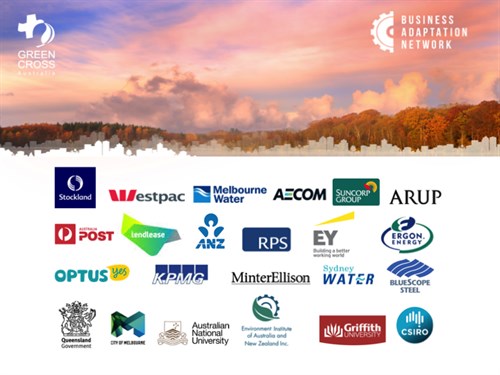

Climate adaptation
A partner-developed Queensland Climate Adaptation Strategy
Queensland Climate Adaptation Strategy - Q-CAS
The Queensland Government has committed to release a whole-of-government, partnership driven climate adaptation strategy to reduce risks to our economy, environment, infrastructure and communities from current and future climate impacts.
Green Cross Australia is thrilled to play a role in supporting adaptation strategy development, as this work goes to the heart of our core purpose. We have been engaged to support the stakeholder engagement program underpinning Q-CAS strategy development, alongside our Business Adaptation Network members.
SEQ Q-CAS stakeholders for the 25 November 2015 cross-sector workshop at QUT!

A genuine partnership is required to tackle challenges ahead
To address the complex issues that emerge in the context of climate change impacts, it is essential that the strategy is developed in partnership with those who carry the risk. Because climate risks are shared by different parts of Queensland society, we are exploring 'Collective Impact' models to empower partner-led adaptation strategies.
A partnership-driven approach is essential if we are to plan and manage current and future climate impacts effectively and efficiently across the spectrum risks and across regions.
In recognition of the many stakeholders that have a role in the delivery of effective adaptation to climate change the Department of Environment and Heritage Protection has supported the establishment of a partnership group to co-create the CAS.
The 27 Q-CAS partners include local government, business, industry, community representatives and environment stewards. As part of the climate adaptation agenda, the Queensland Government will also provide hazard data at a scale appropriate for local level decision making and help increase knowledge about the effect of climate change on health, infrastructure and land use planning.

Resilience of Queensland's natural environment is a priority
In 2015, the Queensland Government committed to developing and implementing a Queensland Climate Adaptation Strategy (Q-CAS) to address risks to our economy, environment, infrastructure and communities from current and future climate impacts. To consider the complex issues that emerge in the context of climate change impacts, the strategy will be developed in partnership with a wide range of sectors and reflect best available science. This approach recognises that we can achieve more if we act together to effectively plan for and manage current and future climate impacts across different sectors and regions.
Well considered and effective adaptation measures can limit the adverse impacts on communities, natural systems and the economy. Adaptation can take many forms, including changing the way we do business, building infrastructure or facilitating species movement.
Green Cross Australia engaged to support the engagement model
Green Cross Australia facilitated the Partnership Group's discussions and broader outreach activities. DibbsBarker's Mark Baker-Jones was appointed Chair of the Partnership Group.
Members of Green Cross Australia's Business Adaptation Network are supporting this initiative.
A genuinely partner-created strategy that embraces diverse sectors can open opportunities for collaboration and positive adaptation responses across Queensland. The following sectors have been involved in early stages of adaptation strategy discussions:
- Development and Infrastructure
- Community
- Environment
- Services
- Finance, Insurance, Banking and Legal
- Natural Resource Management
- Primary Production
- Resources

Copyright © Green Cross Australia | Terms & Conditions | Privacy Policy
web design brisbane :: (zero)seven
